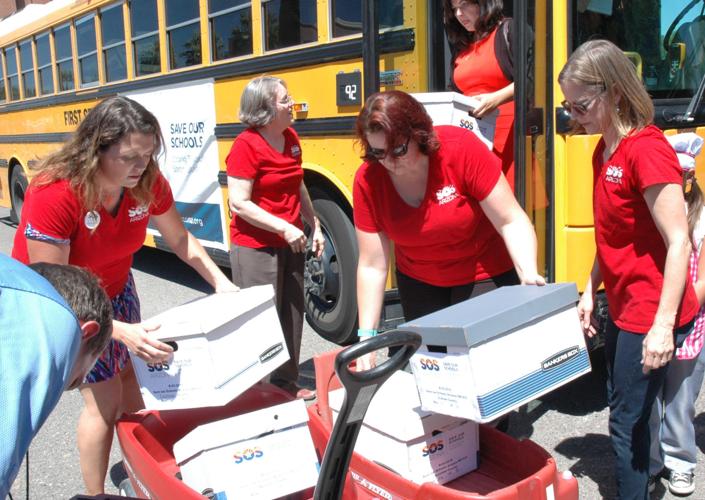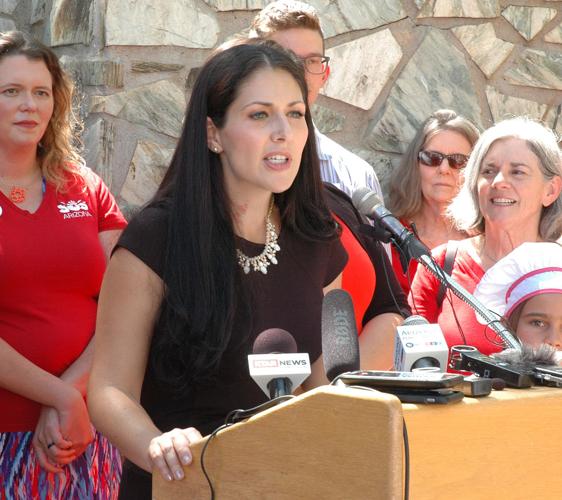PHOENIX — Foes of giving out more vouchers of tax dollars to let children go to private and parochial schools filed petitions Tuesday with more than 111,000 signatures to force the issue to a public vote.
The group Save Our Schools contends that SB 1431 will drain dollars from an already underfunded public school system.
“Class sizes have swelled to almost 40 children per teacher,” said Beth Lewis, a fifth-grade teacher in the Tempe Elementary School District.
“Many schools no longer have tutoring, school nurses, summer school or field trips,” she said at a press conference after the petitions were delivered to the Secretary of State’s Office. “What more can be cut?”
But Sen. Debbie Lesko, R-Peoria, the prime mover behind expanded vouchers, said giving parents vouchers so they have more choices of where to send their children to school does not harm the public schools they leave. And she cited figures from legislative budget analysts who said the vouchers cost less than state aid to public schools, with the legislation actually saving state dollars.
Lewis said even assuming there are fewer children in public schools they’re still stuck with the fixed overhead costs of administration, buses and even maintaining the facilities.
And Dawn Penich-Thacker, a spokeswoman for SOS, said what can’t be ignored is that Arizona is at or near the bottom of the nation in the amount of state aid provided to public schools.
“Arizona’s public schools are already starving,” she said.
Penich-Thacker called diverting some of the dollars to private and parochial schools “the equivalent of taking food off the plate of a hungry child and saying, ‘Well, I left you a crumb.’”
If the secretary of state concludes there are at least 75,321 valid signatures — and other anticipated challenges to the petition by voucher supporters falter — the law expanding voucher eligibility would remain on “hold” until the 2018 general election. At that point it would be up to voters to decide if they want to approve the expanded program or veto it.
Arizona has had vouchers since 2011, when lawmakers agreed to give money to parents whose children with special needs could not be met in the public school system. Arizona courts upheld the legality of the program, saying it does not violate constitutional provisions against state aid to private or parochial schools.
That ruling in turn paved the way for a series of incremental expansions of what are formally known as Empowerment Scholarship Accounts. They are now available for foster children, reservation residents and students attending schools rated D or F.
But the goal all along has been for universal vouchers, a system that foes contend is designed to undermine public education, leaving the public schools with the students whose parents don’t have the resources to drive them to private or parochial schools.
Lesko found herself short of votes for such a plan. So she agreed to an amendment that reduced the dollar amount of the voucher as well as imposed a cap of about 30,000 by 2023.
Penich-Thacker said her group is not opposed to the existing voucher system. And that will remain in place even if SB 1431 is held in abeyance, and even if voters override it next year.
She said, though, there is no reason for students from well-to-do families who probably would attend private schools anyway to get the tuition subsidized by taxpayers.
But Claudia Gamez who showed up at the Save Our Schools news conference, said this isn’t just about helping the wealthy.
Gamez said she has four children who she planned to enroll this year at Sts. Simon and Jude Cathedral School, saying she believes they would get not only a better education but a more “spiritual” one. She said without the vouchers she cannot afford the tuition.
And Gamez was unapologetic about wanting her children to get a Catholic education at taxpayer expense.
Lesko said these are the kind of parents her legislation was designed to help: those who cannot afford to move to a better school district or send their kids to private schools.
“These moms need the help of the ESA,” she said.
Tuesday’s action gives the secretary of state’s office 20 days to count the signatures and come up with a random sample of 5 percent from each county. The counties, in turn, have another 15 days, excluding weekends and holidays, to verify.
None of this affects the existing program that already benefits about 3,500 students who meet the existing requirements.
But Stefan Swiat, spokesman for the Arizona Department of Education, said his agency will not accept applications from those who do not fall into one of the existing qualified categories until there is a final decision on the future of SB 1431.
Lesko said Tuesday that leaves parents hoping to send their children to private school in limbo.





